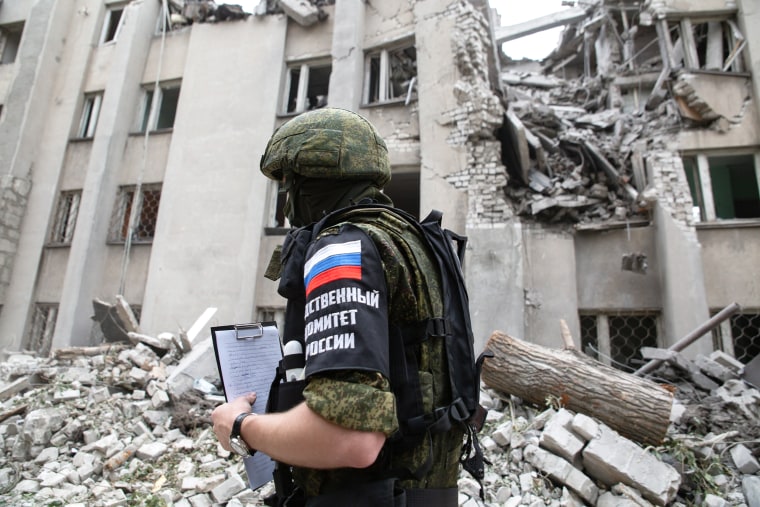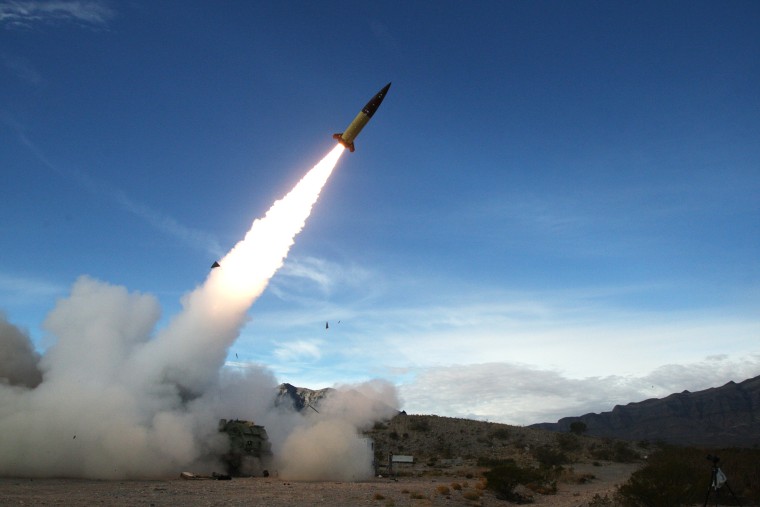The Biden administration has held off on a request from Ukraine to provide longer-range missiles over fears it could provoke a dangerous response from Russia, with senior Pentagon officials opposed to the idea, according to two military officials.
Defense officials who have advised against supplying Ukraine with the longer-range missiles, known as Army Tactical Missile Systems (ATACMs), have voiced concerns that the missiles could be used against targets inside Russian territory and potentially set off a wider war with Russia, the officials told NBC News.
Russian Foreign Ministry spokesperson Maria Zakharova on Thursday warned the United States against providing such a weapon to Ukraine, calling it a “red line.”
“If Washington decides to supply longer-range missiles to Kyiv, then it will be crossing a red line, and will become a direct party to the conflict,” Zakharova said.

The Biden administration on Thursday announced another major package of military assistance for Ukraine worth $600 million, including artillery rounds, mines and more High Mobility Artillery Rocket Systems (HIMARS). But the aid does not include the ATACMs, which have a longer range than the artillery and rocket systems delivered to Ukraine so far.
A number of lawmakers from both parties support Ukraine’s request for the missiles, which have a range of up to 300 kilometers, or about 185 miles. But the Biden administration said last month that Ukraine does not need the longer-range ATACMs, saying that other shorter-range rockets and missiles have proved effective against Russian forces.
On Tuesday, President Joe Biden said that “we’re not going to send to Ukraine rocket systems that strike into Russia,” though he did not specify whether Washington had ruled out certain weapons.
“It’s not on the table at this time,” a senior U.S. official said Friday when asked about the long-range missiles.
But the official said the dynamics of the battlefield can change and “as their needs evolve, the types of assistance evolves.”
The official said Ukraine was able to hit Russian targets with the weapons it has at ranges of less than 100 miles, and added that "there really isn’t much of a pressing need to be firing at a greater distance."
Brig. Gen. Patrick Ryder, the Pentagon press secretary, said senior leaders were in "regular contact with our Ukrainian partners to assess and support their requirements."
"As evidenced by their recent progress, they continue to employ the capabilities provided to them by the U.S. and international community to great effect on the battlefield," Ryder added. "We remain committed to supporting them in their fight to defend their nation."
Since Russia invaded Ukraine on Feb. 24, the Biden administration has shifted its stance on which weapons it is ready to provide to Ukraine’s military as the war has unfolded, amid repeated appeals from Ukraine, Eastern European allies and U.S. lawmakers. The administration initially withheld approval for requests for Stinger anti-aircraft missiles, Howitzer artillery pieces, anti-ship missiles and HIMARS systems, but later gave the green light to the weapons shipments.
However, the administration has remained opposed to supplying fighter jets to Kyiv, saying other weapons would be more effective in the war and that warplanes could escalate tensions with Moscow.
Throughout the conflict, the White House has tried to strike a balance between showing resolve toward Russia without provoking a response that could draw in the United States or NATO as a direct party to the war.
Ukraine so far has chosen not to strike targets in Russian territory with the powerful artillery and rocket systems provided by the United States and other governments, and supporters of Ukraine say Kyiv has every incentive to stick to that approach or else risk losing Western military support.
Rep. Jason Crow of Colorado, a Democrat, praised the Biden administration for the support given to Ukraine so far but said he had been urging officials to provide ATACMs as well as long-range armed drones and even U.S. military advisers to help Ukrainian forces on the ground.
“They’re not going to ask for something they can’t use. They’re not going to ask for something they’re going to misuse. I don’t share concerns about escalation,” he said, adding that he believes the Ukrainians will use the weapons in an appropriate way.
Crow said the United States needs to put the Ukrainians in a position to win, not to be in a stalemate.
“The war is constantly changing and evolving,” Crow said. “The targets are getting further out."
Rep. Mike Rogers of Alabama, the ranking Republican on the House Armed Services Committee, said now is the time to give Ukraine the most effective weapons possible as the country presses a counteroffensive in its east and south.
“I can’t help but imagine how much more successful Ukraine’s counteroffensive would be if President Biden was giving Ukraine all the long range weapons they’ve asked for,” including the ATACMs, Rogers said.
But Rep. Seth Moulton of Massachusetts, a Democrat, defended the Biden administration's decision.
"I want the Ukrainians to have ATACMS as well, but the Biden administration has solid rationale for not giving them these weapons at this moment and they briefed us on that this week," Moulton said.
"The broad criticism that the Biden administration could have acted more quickly in the past is fair, but they’re doing everything right. They’re thinking this through."

